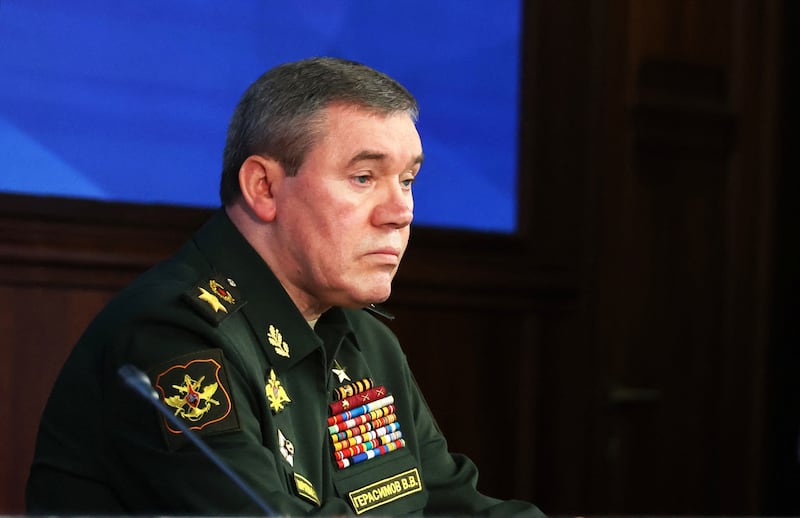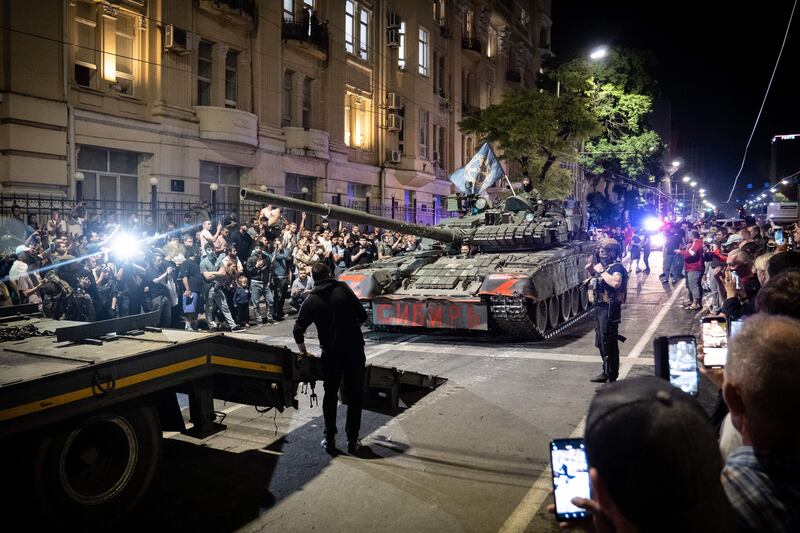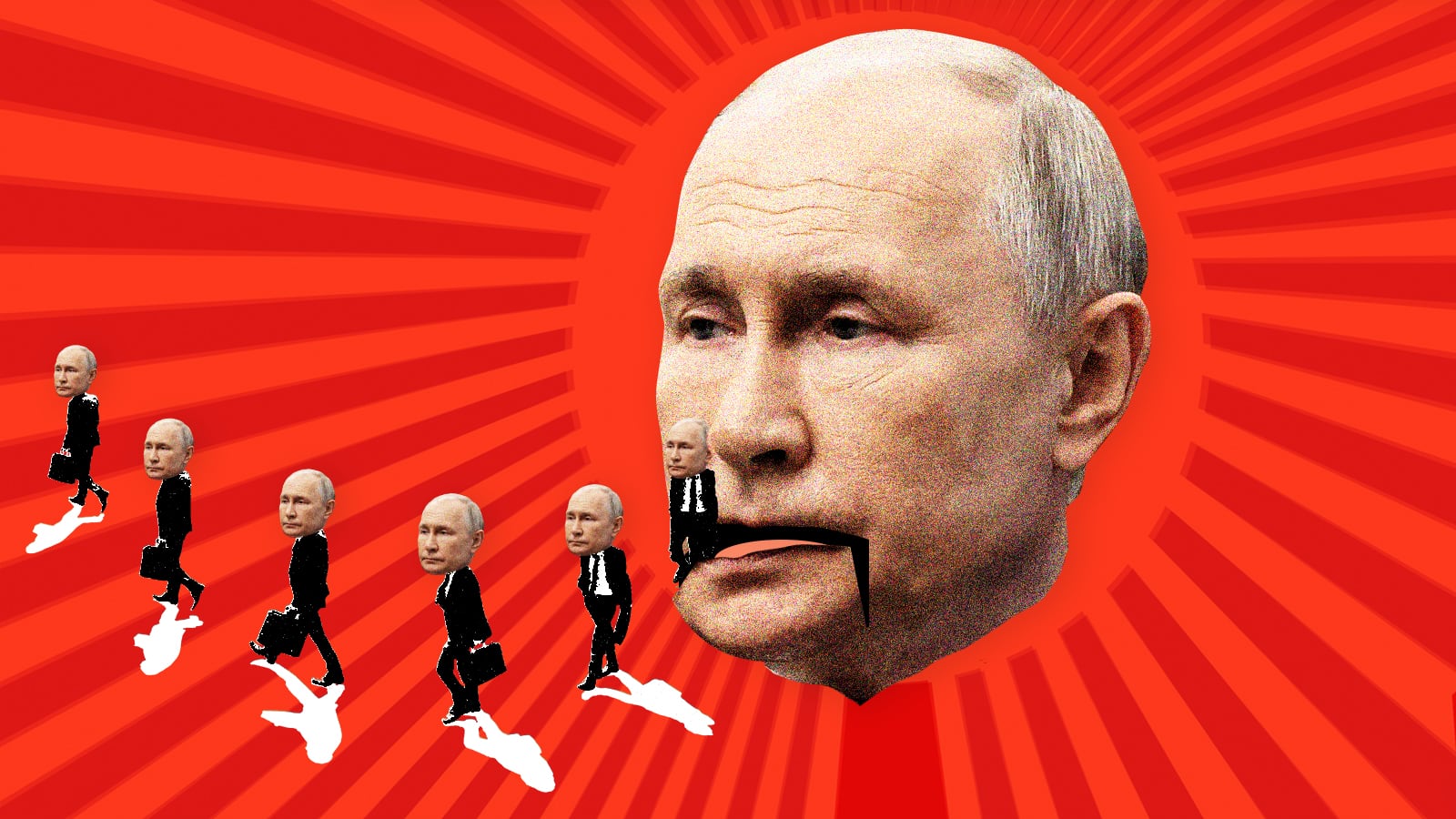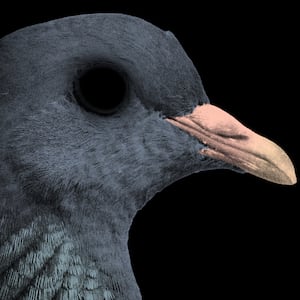The Kremlin has begun cooking up a new influence operation in the city of Rostov-on-Don in Russia, according to an assessment from the Special Operations Forces of the Armed Forces of Ukraine this week.
The assessment states that the operation is focused on training up new pro-Russia propagandists from occupied territories in Ukraine so they can later spread Kremlin lies there.
While many pro-Moscow mouthpieces in Kremlin-occupied territories in Ukraine are Russian, the apparent goal of the new training scheme is to tutor local residents on spreading the Kremlin’s influence, and to try to create an image of local support for the invasion.
Since the start of the war in Ukraine, Russia has spread propaganda around the world to try to influence public perception. Russian disinformation and misinformation operations online have been aimed at quashing support for Ukraine in western countries, according to two U.S. intelligence memoranda The Daily Beast previously obtained. In recent months, Moscow has been running an espionage and propaganda network inside Poland meant to foment the same skepticism, a Polish official told The Daily Beast in an exclusive interview this month.
The Kremlin’s influence effort is focused on spreading propaganda in Russian-occupied territories in Ukraine, in order to expedite acceptance of the occupation and simulate support for it.
The apparent Russian effort to build up more internal propagandists from the occupied territories is a classic move to try to create the appearance of organic support for the takeover in Ukraine, said Darren Linvill, who has been researching Russian information operations for years.
“The Russians understand something that the Russians have always understood—and that all of the competent actors who engage in disinformation understand—and that is that credibility is important,” Linvill, co-director of the Watt Family Innovation Center Media Forensics Hub at Clemson University, told The Daily Beast. “The Russians have understood this in Ukraine… By using both people that are the genuine article, [or] natives to the occupied territories, and people pretending to be native to the occupied territories.”
Russia is likely scrounging for more propaganda over one year into the war and working to add context to Kremlin propaganda broadcast in occupied territories, Roman Osadchuk, an Atlantic Council digital research associate focused on Eurasia in Kyiv, told The Daily Beast.
“This training is just suggesting that there is a need for more propaganda soldiers, and they are desperate to find those people,” Osadchuk said. “There were not so many Ukrainian journalists who were willing to work with them in the occupation territories. So they need to find new people and train them.”
It’s not clear how long the training will last and what the training entails. But Russian efforts to simulate and influence Ukrainian support for the occupation date back years. In 2014, when Russia illegally annexed Crimea, Russia’s media takeover was swift, with blocked internet sites and gagging of independent media that questioned the Kremlin line. The White House called the referenda Putin ran last year to justify annexing new regions in Ukraine “pre-staged” and “orchestrated by the Kremlin.” Russian propaganda proliferated thereafter.
Taking Charge
The location of the new training effort in Rostov-on-Don could hold symbolic value as Putin works to shore up his control within his own government.
The effort to bolster Russian propaganda targeting Ukraine coincides with a visit from Russian President Vladimir Putin to Rostov-on-Don this weekend in an apparent attempt to broadcast control over his regime.
During his visit to Rostov-on-Don, Putin met with military commanders overseeing the war in Ukraine, including Chief of the General Staff of the Russian Armed Forces, Valery Gerasimov, according to TASS.

The Chief of the Russian General Staff Valery Gerasimov at an expanded meeting of the Russian Defence Ministry Board in Moscow, on Dec. 21, 2022.
Mikhail Kireyev/Sputnik/AFP via Getty ImagesGerasimov has been a key architect of Russia using “non-military” measures in war—including information warfare and propaganda—in concert with combat and kinetic means to achieve Russian goals.
“The very ‘rules of war’ have changed,” Gerasimov famously wrote in an article in 2016 that is thought to provide key insights to senior Russian military thinking on war. “The role of nonmilitary means of achieving political and strategic goals has grown, and, in many cases, they have exceeded the power of force of weapons in their effectiveness.”
It was Putin’s first visit to Rostov-on-Don since Wagner boss Yevgeniy Prigozhin staged his revolt there in June. The march on Moscow this summer was the largest challenge to Putin’s hold on power in years, according to some analysts, many of whom argued it would almost certainly result in Putin retaliating against the mercenary boss.

Members of Wagner group prepare to return to base in Rostov-on-Don on June 24, 2023, following the rebellion led by Prigozhin.
Photo by Roman Romokhov/AFP via Getty ImagesPutin appears to have played his cards just this week, when a plane said to be carrying Prigozhin and some Wagner associates crashed in Russia Wednesday. Putin said Prigozhin died after making “serious” mistakes.
The Pentagon believes Prigozhin is likely to be dead.
The Propaganda Play
Russia has already been running several propaganda hubs in occupied territories in Ukraine since last year. At the center of that operation is Alexander Malkevich, whom the United States has sanctioned on multiple occasions in the last several years for working on behalf of Prigozhin—as a protégé running global influence operations.
In Ukraine, Malkevich seized the opportunity to support Russia’s war effort by spreading propaganda, establishing a streaming platform, organizing annexation referenda, and recruiting officials to serve in the occupation government, according to an investigation from Reporters Without Borders (RSF).
His propaganda operation in Ukraine, which he established last year, includes ZaMedia group in Melitopol, with the propaganda television station ZaTV, as well as Tavria TV. He also established Mariupol 24 in Mariupol, and eventually, a journalism school in Kherson to work on recruiting locals to join the propaganda outposts.
Malkevich himself has been peddling Russian propaganda online, sporting a shirt with a “Z” meant to show support for Russia’s war effort in Ukraine, and touring regions of Russian-occupied territory in the country.
The Prigozhin protégé is one of the 15 most influential Russian journalists on Telegram as of July, ranking in 13th place by number of mentions and reach of posts, according to TGstat.
Russia has also been working to funnel propaganda straight to the youth in Ukraine through Malkevich, by running seminars for youth in the occupied territories. Malkevich’s Telegram channel has been enthusiastically posting about the events, one of which recently took place in Berdyansk in Zaporizhzhia.
The event, “Young South,” drew more than 1,000 young people from Zaporizhzhia, Kherson, Luhansk, and Donetsk to learn how to deal with “information confrontation that today dictates to us,” Malkevich’s channel said Tuesday.
“At one of the forum sessions, I spoke on the topic of survival (and victory) in information wars. I believe that in an era of great change, this issue is especially relevant. When the interests of several parties collide, the information war becomes one of the main tools for achieving goals. And our youth must learn to lead it skillfully and competently,” Malkevich’s channel said. “It is important to train specialists who can clearly and correctly convey the position of the state.”
But much of Malkevich’s media empire, so far, doesn’t pull on local talent, and instead leans on people from his hometown of Saint Petersburg in Russia, which Malkevich has only been able to do by offering hefty pay bumps, according to RSF.
The latest training effort in Rostov-on-Don suggests Moscow is interested in bolstering and expanding its propaganda operation in Ukraine beyond the existing schemes, and perhaps finding a new way forward, said Linvill.
“I think it’s interesting that they’re not connecting it to the previous campaign… it does suggest that there are other broader changes happening in the propaganda landscape with Prigozhin out,” Linvill said.








